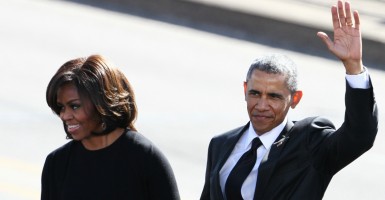The year was 1965; the date March 7. Known as “Bloody Sunday,” it was the day brothers and sisters of all walks of life gathered in Selma, Alabama, for a movement that would leave a lasting mark on this country’s history.
Motivated by a cause larger than themselves, these brave individuals set out on a treacherous journey to Montgomery in hopes of achieving political and civil change for black Americans. The world nervously watched as a merciless resistance formed against them on the Edmund Pettus Bridge, orchestrated in large part by the very people responsible for protecting the rights and liberties of all.
Nevertheless, they would not be denied. Their cause was great and noble.
This weekend, citizens and political leaders from across the nation gathered to remember those at Selma who answered the call for racial equality.
Many in attendance at Selma this weekend were gathered there for the first time, only knowing about the events of that time from history books and stories passed down from the generation before them. But for some, it was returning to a place that has changed in appearance over the years but continues to hold the cries and passions of 600 people determined to finally see past promises come to fruition.
“I thought I saw death,” said Representative John Lewis, D-Ga., as he reflected on that day before welcoming President Barack Obama to the stage. “I thought I was going to die.”
On that gruesome day, fierce violence collided with the blood, sweat and tears of the innocent. Like the then-25-year-old John Lewis, those who were beaten and bruised couldn’t imagine what the next moments had in store for them.
But their sacrifices were not in vain. Instead, their actions helped bring about a future that exceeded anyone’s loftiest dreams. Who could have foreseen that their march would pave the way for a black president and congressman to share a stage 50 years later?
“If someone told me 50 years ago I’d be back on this bridge introducing a black president of the United States, I’d have said you’re crazy,” said Lewis.
Seeing a man that has experienced so much over his lifetime reflect on how far we have come as a country is truly humbling. Just place yourself in his shoes. Imagine being confronted by an armed resistance, hell-bent on attacking a peaceful gathering of fellow Americans, unsure if you would even make it out alive.
Now turn the page to a new chapter of American history—50 years later and standing a few paces away from where the violence took place. This time, however, you are facing a crowd sharing in the legacy you created…talk about goosebumps.
Looking towards the future, both Obama and Lewis agreed that while progress has been made, there is still work to be done.
“We honor those who walked so we could run,” Obama said. “We must run so our children soar. And we will not grow weary. For we believe in the power of an awesome God, and we believe in this country’s sacred promise.”
The challenges we face today are incomparable to the struggles of those who crossed that bridge or participated in any of the Selma marches. That in itself is a truly encouraging blessing. For as we continuously work to create a civil society rooted in freedom and opportunity, we do so in a vastly different America.
We are a strong people who have come a long way. “We do a disservice to the cause of justice by intimating that bias and discrimination are immutable, or that racial division is inherent to America,” said Obama. “If you think nothing’s changed in the past fifty years, ask somebody who lived through the Selma or Chicago or L.A. of the fifties.”
The events of Selma, Ala. are one of the most tragic moments in our country’s history. But the courage and bravery displayed at Selma 50 years ago showed the spirit of the American people. We are far from perfect, but what makes our country exceptional is that we are always looking towards improving the lives of our people.




























